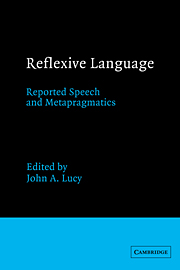Book contents
- Frontmatter
- Contents
- Acknowledgments
- General introduction
- Part I Theoretical foundations
- Part II The relation of form and function in reflexive language
- Part III Text, context, and the cultural functions of reflexive language
- Introduction to Part III
- 7 Generic versus metapragmatic dimensions of Warao narratives: who regiments performance?
- 8 Performance form and the voices of characters in five versions of the Wasco Coyote Cycle
- 9 The represented functions of speech in Shokleng myth
- 10 The political function of reported speech: a Belauan example
- Part IV Interpretation, reported speech, and metapragmatics in the Western tradition
- Name index
- Subject index
7 - Generic versus metapragmatic dimensions of Warao narratives: who regiments performance?
from Part III - Text, context, and the cultural functions of reflexive language
Published online by Cambridge University Press: 22 January 2010
- Frontmatter
- Contents
- Acknowledgments
- General introduction
- Part I Theoretical foundations
- Part II The relation of form and function in reflexive language
- Part III Text, context, and the cultural functions of reflexive language
- Introduction to Part III
- 7 Generic versus metapragmatic dimensions of Warao narratives: who regiments performance?
- 8 Performance form and the voices of characters in five versions of the Wasco Coyote Cycle
- 9 The represented functions of speech in Shokleng myth
- 10 The political function of reported speech: a Belauan example
- Part IV Interpretation, reported speech, and metapragmatics in the Western tradition
- Name index
- Subject index
Summary
Structural and generative linguists and conversation analysts have traditionally assumed that the essential properties of language and interaction are most clearly — if not uniquely — revealed in “ordinary” uses of language. This belief has gone hand-inhand with a focus respectively on isolated sentences and “everyday conversations” as primary sources of data and the conviction that the inaccessibility of much linguistic patterning to the conscious awareness of native speakers renders the latter's reflections on language, which Silverstein (1979) has termed “linguistic ideologies,” beneath contempt. Boas (1911: 71) was perhaps the clearest in his condemnation of “the misleading and disturbing factors of secondary explanations,” arguing that their appearance is a threat to the clarity of ethnographic analysis. Boas argued that linguistic inquiry by contrast offers a “great advantage” in that linguistic categories “always remain unconscious.” This stance, which itself is highly ideological, provides the linguist with a privileged vantage point from which to identify and illuminate fundamental truths that are invisible to non-initiates. The privileging of “ordinary” language use similarly echoes a Kantian aesthetics in its assertion that poetically structured texts reveal only a subjective experience of beauty and not either cognitive knowledge about the world and our means of perceiving it or norms of interaction between human beings.
- Type
- Chapter
- Information
- Reflexive LanguageReported Speech and Metapragmatics, pp. 179 - 212Publisher: Cambridge University PressPrint publication year: 1993
- 18
- Cited by



